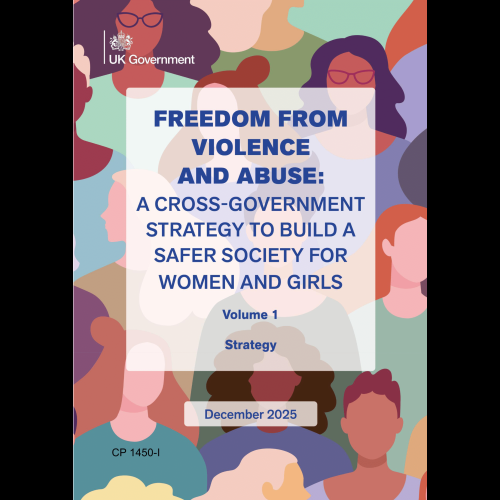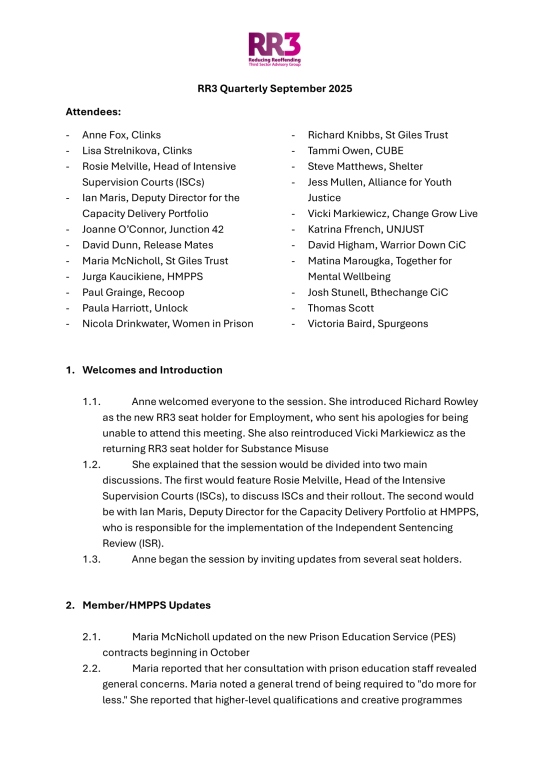We recently did a survey of Voluntary and Community Sector (VCS) groups working in prisons, and reading the responses made me reflect on my time working on VCS partnerships in a prison. You can download the full report here.
I am a Local Development Officer for Clinks, but for 4 years I worked for a national charity at a women’s prison, as one of only two full time VCS partnership co-ordinators in the country at the time. It was in the mid-2000s when there was still a central mandate, Prison Service Order (PSO) 4190 ‘Strategy for Working with the VCS’, to support partnerships and promote best practice between prisons and VCS providers. It helped us to integrate support and resettlement projects into the fabric of the prison, enabling the VCS contribute to (but not be bound by) the prison’s key performance targets. It also helped to raise the awareness amongst prisoners and prison staff as to what the VCS does. In short this was the beginning of an acknowledgement that the Sector was a professional body within the Criminal Justice System (CJS), to be consulted, respected and valued.
I was and remain under no illusion that it was the same in every prison and more now than ever I am aware that much stood or fell on the goodwill of key staff. For example: governors nervously committing budgets to test new initiatives, or, education staff having the contract flexibility to allow someone to leave a class early to attend an abuse counselling session.
The results outweigh the challenges
The challenges could be extremely frustrating and I often had the head meets brick wall feeling when trying to resolve what was a simple problem. But when it worked it worked so brilliantly, with repeat funding allocated on the basis of what could be seen to be working, as well as charitable funding adding capacity to the rehabilitative and resettlement services of a prison. Seeing a group of some of the most vulnerable women perform in a concert, complete a budgeting course, or record a bedtime story for their child was heart wrenching. Not for any feel-good factor on my part, but because you saw what could be achieved. Even with a formal partnership agreement in place, success was often the culmination of enthusiastic and helpful prison staff and determined VCS organisations jumping through numerous hoops to deliver their service.
We have lost a useful partnership mandate
I often met prison staff in other prisons that had only a few hours to try and develop links with resettlement services, sometimes with little knowledge of the sector or support to achieve the ambitious task. But leaving the role 4 years later, there were quarterly regional meeting for all the prison partnership coordinators, which addressed challenges and shared resources.
The PSO was by no means perfect and certainly needed some teeth added, but it was a point of principle that it existed, to say to prisons that they should regulate their relationship with the VCS through a number of mandatory requirements. However, that PSO no longer exists. There was an attempt at a rewrite in consultation with partners, but much of the mandatory actions had been removed and Clinks were contacted by a number of prison partnership co-ordinators expressing their disappointment.
What the VCS say about their work in prison now
Clinks expected to hear things had got more difficult for the VCS. Anecdotal comments made us suspect partnerships had been eroded, with many prisons and VCS organisations parting ways as limited funding and staff time shrank.
We were surprised, 184 VCS organisations responded and there were some encouraging signs. Almost 2/3 had a formal contract or written agreement with the prison and the majority stated that relationships with prison staff had improved. Over half stated their named contact was at a senior management level. In addition, organisations said they were often able to access in-house training in the prisons, and a majority felt that prison staff had a good understanding as to what the project achieving.
Not all the news was good news. Over 40% of respondents had lost funding to deliver projects in prisons (from all funding sources). Other cuts in prison staff caused difficulties with one organisation stating that their regular wing visits were curtailed due to staff shortages;
“... a new policy at one prison meant that no external personnel were allowed on wings other than through legal visits, because of this our crucial pre-project work going round and meeting people informally and encouraging take-up, plus our crucial post-project work getting in depth feedback from people, was no longer possible”. – VCS provider
There is a long history of the VCS in prisons and current policy continues to promote a role for the VCS in delivering services. We are clearly recognised as a key provider, but the current economic constraints will have a long-term impact on the quantity and range of services operating in prison. The abandoned PSO did help to incorporate the VCS into the prisons’ formal processes and although some local engagement strategies now exist, we need formal, robust partnerships, mutual respect and an understanding (by both sectors) of the pressures faced in trying to deliver services to prisoners.
Where are the goal posts now?
The dogged way that the VCS keeps going to ensure that our services get to the most needy is quite remarkable. The terms ‘the goal posts keep shifting’ or ‘what goal posts?’ have been dropped into conversations time and time again when I talk to projects working in prison. Getting savvy on the latest policy language to adopt, finding out who now leads on prison resettlement or education, and trying to squeeze data into ill-fitting measurement tools is a full-time occupation in itself. But the survey suggests that governors and prison staff want VCS services and are trying to keep them. Many prisons are struggling to keep it thus, with the challenges that they now face in their own sector.
The current economy is challenging, with the main threat identified in the survey being increased pressure faced by both prisons and the VCS to do more with less. And whilst the majority of respondents had a positive experience of working with prisons, the minority that didn’t are just as vital to the prison service and the successful rehabilitation of offenders. So what does the future hold, particularly given the recent announcement of changes to the prison estate?
Here are some questions to spark debate, use the comment facility below to voice your opinion.
What does the future hold for your organisation’s work in prison?
How can the sector influence central government on VCS work in prisons if there is no longer a central mandate/prison service order?
What support would you like to see from Clinks?
What's new
Blogs
Violence Against Women and Girls (VAWG) Strategy Blog
Publications
Latest on X
The role is for a leader from an organisation focused on racially minoritised people, with expertise in service delivery, policy, advocacy, or related areas in criminal justice. Racial disparities are present at every CJS stage. This role ensures these voices are central in shaping policy to help address and eradicate them. Apply by Mon 18 Nov, 10am. More info: https://www.clinks.org/voluntary-community-sector/vacancies/15566 #CriminalJustice #RR3 #RacialEquity

